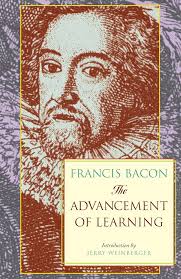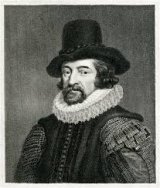The Advancement of Learning Page #17
The Advancement of Learning, published by Francis Bacon in 1605, is a foundational text in the history of science and philosophy. In this work, Bacon advocates for empirical research and the systematic organization of knowledge, laying the groundwork for the scientific method. The book critiques existing scholarly practices and proposes a new approach to learning based on observation and experimentation. It marks a significant shift towards modern scientific inquiry.
- Year:
- 1605
- 1,170 Views
Submitted by acronimous on August 11, 2024
Modified by acronimous on August 11, 2024
love their crown. (19) Weigh also that excellent taxation of an error, ordinary with counsellors of princes, that they counsel their masters according to the model of their own mind and fortune, and not of their masters. When upon Darius’ great offers Parmenio had said, “Surely I would accept these offers were I as Alexander;” saith Alexander, “So would I were I as Parmenio.” (20) Lastly, weigh that quick and acute reply which he made when he gave so large gifts to his friends and servants, and was asked what he did reserve for himself, and he answered, “Hope.” Weigh, I say, whether he had not cast up his account aright, because hope must be the portion of all that resolve upon great enterprises; for this was Cæsar’s portion when he went first into Gaul, his estate being then utterly overthrown with largesses. And this was likewise the portion of that noble prince, howsoever transported with ambition, Henry Duke of Guise, of whom it was usually said that he was the greatest usurer in France, because he had turned all his estate into obligations. (21) To conclude, therefore, as certain critics are used to say hyperbolically, “That if all sciences were lost they might be found in Virgil,” so certainly this may be said truly, there are the prints and footsteps of learning in those few speeches which are reported of this prince, the admiration of whom, when I consider him not as Alexander the Great, but as Aristotle’s scholar, hath carried me too far. (22) As for Julius Cæsar, the excellency of his learning needeth not to be argued from his education, or his company, or his speeches; but in a further degree doth declare itself in his writings and works: whereof some are extant and permanent, and some unfortunately perished. For first, we see there is left unto us that excellent history of his own wars, which he entitled only a Commentary, wherein all succeeding times have admired the solid weight of matter, and the real passages and lively images of actions and persons, expressed in the greatest propriety of words and perspicuity of narration that ever was; which that it was not the effect of a natural gift, but of learning and precept, is well witnessed by that work of his entitled De Analogia, being a grammatical philosophy, wherein he did labour to make this same Vox ad placitum to become Vox ad licitum, and to reduce custom of speech to congruity of speech; and took as it were the pictures of words from the life of reason. (23) So we receive from him, as a monument both of his power and learning, the then reformed computation of the year; well expressing that he took it to be as great a glory to himself to observe and know the law of the heavens, as to give law to men upon the earth. (24) So likewise in that book of his, Anti-Cato, it may easily appear that he did aspire as well to victory of wit as victory of war: undertaking therein a conflict against the greatest champion with the pen that then lived, Cicero the orator. (25) So, again, in his book of Apophthegms, which he collected, we see that he esteemed it more honour to make himself but a pair of tables, to take the wise and pithy words of others, than to have every word of his own to be made an apophthegm or an oracle, as vain princes, by custom of flattery, pretend to do. And yet if I should enumerate divers of his speeches, as I did those of Alexander, they are truly such as Solomon noteth, when he saith, Verba sapientum tanquam aculei, et tanquam clavi in altum defixi: whereof I will only recite three, not so delectable for elegancy, but admirable for vigour and efficacy. (26) As first, it is reason he be thought a master of words, that could with one word appease a mutiny in his army, which was thus: The Romans, when their generals did speak to their army, did use the word Milites, but when the magistrates spake to the people they did use the word Quirites. The soldiers were in tumult, and seditiously prayed to be cashiered; not that they so meant, but by expostulation thereof to draw Cæsar to other conditions; wherein he being resolute not to give way, after some silence, he began his speech, Ego Quirites, which did admit them already cashiered—wherewith they were so surprised, crossed, and confused, as they would not suffer him to go on in his speech, but relinquished their demands, and made it their suit to be again called by the name of Milites. (27) The second speech was thus: Cæsar did extremely affect the name of king; and some were set on as he passed by in popular acclamation to salute him king. Whereupon, finding the cry weak and poor, he put it off thus, in a kind of jest, as if they had mistaken his surname: Non Rex sum, sed Cæsar; a speech that, if it be searched, the life and fulness of it can scarce be expressed. For, first, it was a refusal of the name, but yet not serious; again, it did signify an infinite confidence and magnanimity, as if he presumed Cæsar was the greater title, as by his worthiness it is come to pass till this day. But chiefly it was a speech of great allurement toward his own purpose, as if the state did strive with him but for a name, whereof mean families were vested; for Rex was a surname with the Romans, as well as King is with us. (28) The last speech which I will mention was used to Metellus, when Cæsar, after war declared, did possess himself of this city of Rome; at which time, entering into the inner treasury to take the money there accumulate, Metellus, being tribune, forbade him. Whereto Cæsar said, “That if he did not desist, he would lay him dead in the place.” And presently taking himself up, he added, “Young man, it is harder for me to speak it than to do it—Adolescens, durius est mihi hoc dicere quàm facere.” A speech compounded of the greatest terror and greatest clemency that could proceed out of the mouth of man. (29) But to return and conclude with him, it is evident himself knew well his own perfection in learning, and took it upon him, as appeared when upon occasion that some spake what a strange resolution it was in Lucius Sylla to resign his dictators, he, scoffing at him to his own advantage, answered, “That Sylla could not skill of letters, and therefore knew not how to dictate.” (30) And here it were fit to leave this point, touching the concurrence of military virtue and learning (for what example should come with any grace after those two of Alexander and Cæsar?), were it not in regard of the rareness of circumstance, that I find in one other particular, as that which did so suddenly pass from extreme scorn to extreme wonder: and it is of Xenophon the philosopher, who went from Socrates’ school into Asia in the expedition of Cyrus the younger against King Artaxerxes. This Xenophon at that time was very young, and never had seen the wars before, neither had any command in the army, but only followed the war as
Translation
Translate and read this book in other languages:
Select another language:
- - Select -
- 简体中文 (Chinese - Simplified)
- 繁體中文 (Chinese - Traditional)
- Español (Spanish)
- Esperanto (Esperanto)
- 日本語 (Japanese)
- Português (Portuguese)
- Deutsch (German)
- العربية (Arabic)
- Français (French)
- Русский (Russian)
- ಕನ್ನಡ (Kannada)
- 한국어 (Korean)
- עברית (Hebrew)
- Gaeilge (Irish)
- Українська (Ukrainian)
- اردو (Urdu)
- Magyar (Hungarian)
- मानक हिन्दी (Hindi)
- Indonesia (Indonesian)
- Italiano (Italian)
- தமிழ் (Tamil)
- Türkçe (Turkish)
- తెలుగు (Telugu)
- ภาษาไทย (Thai)
- Tiếng Việt (Vietnamese)
- Čeština (Czech)
- Polski (Polish)
- Bahasa Indonesia (Indonesian)
- Românește (Romanian)
- Nederlands (Dutch)
- Ελληνικά (Greek)
- Latinum (Latin)
- Svenska (Swedish)
- Dansk (Danish)
- Suomi (Finnish)
- فارسی (Persian)
- ייִדיש (Yiddish)
- հայերեն (Armenian)
- Norsk (Norwegian)
- English (English)
Citation
Use the citation below to add this book to your bibliography:
Style:MLAChicagoAPA
"The Advancement of Learning Books." Literature.com. STANDS4 LLC, 2025. Web. 10 Mar. 2025. <https://www.literature.com/book/the_advancement_of_learning_3165>.








Discuss this The Advancement of Learning book with the community:
Report Comment
We're doing our best to make sure our content is useful, accurate and safe.
If by any chance you spot an inappropriate comment while navigating through our website please use this form to let us know, and we'll take care of it shortly.
Attachment
You need to be logged in to favorite.
Log In